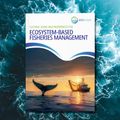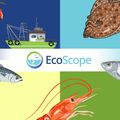New EcoSystem marine ecosystem model framework opens research possibilities for small budget labs
EU-funded EcoScope researchers have developed an innovative distributed execution framework based on low-lech, freely available technology, enabling the systematic execution, validation, assessment and analysis of linked marine ecosystem model (MEM) – earth system model (ESM) prediction ensembles, detailed by the researchers in a recent publication of Earth’s Future.
The article, titled “Making Ecosystem Modeling Operational – A Novel Distributed Execution Framework to Systematically Explore Ecological Responses to Divergent Climate Trajectories”, was authored by Jeroen Steenbeek, Pablo Ortega, Raffaele Bernardello, Villy Christensen, Mara Coll, Eleftheria Exarchou, Alba Fuster-Alonso, Ryan Heneghan, Laura Julià Melis, Maria Grazia Pennino, David Rivas and Noel Keenlyside.
“This work demonstrates that it is physically possible to systematically assess the biggest and most complicated marine ecosystem models across existing computers and using freely available tools,” explained EcoScope’s Jeroen Steenbeek, Software Engineer at Ecopath International Initiative and PhD student at the Universitat Politècnica de Catalunya.
Steenbeek called it “a low-tech band-aid solution to a 30-year-old technical bottleneck, given the persistent academic constraints of lacking the funding to bring in IT people and expensive hardware”, noting that “still, to this day and age, most marine ecosystem modellers can only dream of having access to IT professionals who know how to set up docker environments.”
The researchers explained that most marine ecosystem modellers lack the skills and resources to systematically calibrate, validate and assess the models for uncertainty.
“Here we present a low-tech and open-source-run framework to use any computer network as a distributed model execution and assessment system. We use the framework to mass-execute an ESM / MEM ensemble to assess the ecosystem impact of uncertainty in earth system predictions,” they said.
The innovation presented is a key improvement in how scientists can use computer models integrating climate and oceanographic factors to better understand the impacts of climate change and human activities on marine ecosystems, the team explained, adding that improving the robustness of such models improves the quality of the science informing decision makers towards making robust decisions. Such complex marine ecosystem models, however, require running multiple complex computer simulations, which is difficult technically and prohibitively expensive, beyond the reach of most marine ecosystem modelers.
“Here we introduce a possible solution to overcome the difficulties, using only simple and free technologies to facilitate the systematic execution of complex ecosystem models across networks of computers, to allow any modeling group to perform these exercises,” the team said.
The researchers demonstrated the solution by running a global marine ecosystem model, EcoOcean, hundreds of times, to see how it is affected by variability in ocean conditions. While with previous methods, this modelling task would have taken weeks to complete, they were able to complete it in just 30 hours, just using available laptops and desktops.
“It is conceptually simple solutions such as these that may make the process of marine ecosystem modelling easier and more operational around the globe, thus opening the door for scientific management breakthroughs,” the researchers emphasised.
“Our case study demonstrates that a simple and free distributed execution framework has the potential to empower any modeling group with the fundamental capabilities to operationalise marine ecosystem modelling”, they added.
More technically, the researchers reported that the results of the experiment they carried out indicate that ESM internal variability has a relatively low impact on the MEM variability when compared with broad assumptions related to reconstructed fisheries, though the results are sensitive to the ESM specificities.
“Our case study warrants further systematic explorations to disentangle the impacts of climate change, fisheries scenarios, MEM internal ecological hypotheses, and ESM variability,” they concluded.

A schematic overview of the workflow needed to systematically assess Marine Ecosystem Models, here used to perform a hypothetical limited uncertainty assessment. The left panel shows this exercise deployed on a single desktop computer; the right panel shows this same exercise, transparently dispatched across any available hardware.





